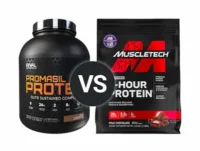Knowledge BaseYou're Questions Answered
How does protein powder impact insulin levels and blood sugar control?
Protein powder is a popular dietary supplement used to increase protein intake, support muscle growth, and aid in recovery. Its impact on insulin levels and blood sugar control can vary depending on the type of protein, the individual's metabolic health, and the context in which it is consumed. Below, we explore the general effects of protein powder on insulin levels and blood sugar control, as well as considerations for individuals with different health goals.
Impact on Insulin Levels
-
Insulin Secretion
Protein intake, including protein powders, can stimulate insulin secretion. Insulin is a hormone that helps regulate blood glucose levels by facilitating the uptake of glucose into cells. The degree of insulin response varies depending on the type of protein consumed. For instance, whey protein is known to induce a relatively high insulin response compared to other protein sources, such as casein or soy. This is due to the rapid digestion and absorption of whey protein, which leads to a quick increase in amino acid levels in the blood1. These amino acids can stimulate insulin release, which helps to shuttle glucose and amino acids into muscle cells, promoting muscle protein synthesis.
-
Insulinogenic Amino Acids
Certain amino acids found in protein powders, such as leucine, arginine, and lysine, are particularly insulinogenic, meaning they stimulate insulin release. Leucine, in particular, plays a significant role in muscle protein synthesis and can enhance insulin secretion2. This insulin response can be beneficial for muscle recovery and growth, especially when consumed post-workout, as it helps replenish glycogen stores and repair muscle tissue.
Impact on Blood Sugar Control
-
Glycemic Response
The glycemic response to protein powder depends on the type of protein and any additional ingredients, such as carbohydrates or sweeteners. Generally, protein has a minimal effect on blood glucose levels compared to carbohydrates. For example, consuming whey protein with a low glycemic index (GI) carbohydrate source can result in a moderate insulin response without causing significant spikes in blood glucose levels3. This makes protein powders a useful tool for managing blood sugar levels, particularly in individuals with insulin resistance or diabetes.
-
Satiety and Blood Sugar Stability
Protein is known to increase satiety, which can help reduce overall calorie intake and prevent blood sugar spikes. By slowing gastric emptying and reducing the rate at which glucose enters the bloodstream, protein can help maintain more stable blood sugar levels4. This is particularly beneficial for individuals aiming to control blood sugar levels and manage their weight.
Considerations for Different Health Goals
-
For Muscle Building and Recovery
For those focused on muscle building and recovery, the insulin response from protein powders, particularly whey, can be advantageous. The combination of insulin and amino acids promotes muscle protein synthesis and glycogen replenishment, supporting recovery and growth5.
-
For Blood Sugar Management
Individuals with diabetes or insulin resistance should choose protein powders with minimal added sugars and consider combining them with high-fiber, low-GI foods to avoid spikes in blood glucose levels. Monitoring blood sugar levels and consulting with a healthcare professional can help tailor protein intake to individual needs.
-
For Weight Management
Protein powders can aid in weight management by increasing satiety and reducing overall calorie intake. Choosing low-calorie, low-sugar options can help support weight loss efforts while maintaining muscle mass.
- Pal, S., Ellis, V., & Dhaliwal, S. (2010). Effects of whey protein isolate on body composition, lipids, insulin and glucose in overweight and obese individuals. British Journal of Nutrition, 104(5), 716-723.
- Garlick, P. J. (2005). The role of leucine in the regulation of protein metabolism. Journal of Nutrition, 135(6), 1553S-1556S.
- Nilsson, M., Stenberg, M., Frid, A. H., Holst, J. J., & Björck, I. M. (2004). Glycemia and insulinemia in healthy subjects after lactose-equivalent meals of milk and other food proteins: the role of plasma amino acids and incretins. The American Journal of Clinical Nutrition, 80(5), 1246-1253.
- Veldhorst, M. A., Nieuwenhuizen, A. G., Hochstenbach-Waelen, A., van Vught, A. J., Westerterp-Plantenga, M. S., & Westerterp, K. R. (2009). Effects of complete whey-protein breakfasts versus whey without GMP-breakfasts on energy intake and satiety. Appetite, 52(2), 388-395.
- Farnfield, M. M., Trenerry, C., Carey, K. A., Cameron-Smith, D., & McKenna, M. J. (2009). Plasma amino acid response after ingestion of different whey protein fractions. International Journal of Food Sciences and Nutrition, 60(6), 476-486.

Your Answer
We are a participant in the Amazon Services LLC Associates Program, an affiliate advertising program designed to provide a means for us to earn fees by linking to Amazon.com and affiliated sites.


